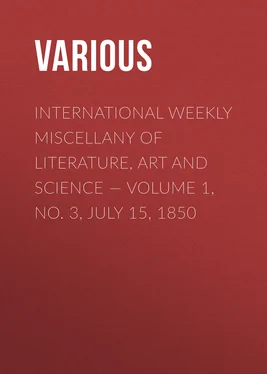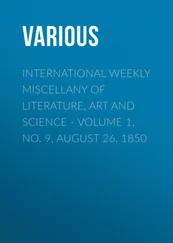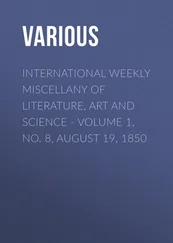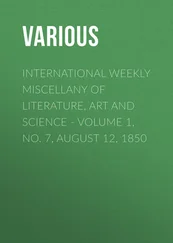Various - International Weekly Miscellany of Literature, Art and Science — Volume 1, No. 3, July 15, 1850
Здесь есть возможность читать онлайн «Various - International Weekly Miscellany of Literature, Art and Science — Volume 1, No. 3, July 15, 1850» — ознакомительный отрывок электронной книги совершенно бесплатно, а после прочтения отрывка купить полную версию. В некоторых случаях можно слушать аудио, скачать через торрент в формате fb2 и присутствует краткое содержание. Жанр: foreign_antique, periodic, foreign_edu, на английском языке. Описание произведения, (предисловие) а так же отзывы посетителей доступны на портале библиотеки ЛибКат.
- Название:International Weekly Miscellany of Literature, Art and Science — Volume 1, No. 3, July 15, 1850
- Автор:
- Жанр:
- Год:неизвестен
- ISBN:нет данных
- Рейтинг книги:5 / 5. Голосов: 1
-
Избранное:Добавить в избранное
- Отзывы:
-
Ваша оценка:
- 100
- 1
- 2
- 3
- 4
- 5
International Weekly Miscellany of Literature, Art and Science — Volume 1, No. 3, July 15, 1850: краткое содержание, описание и аннотация
Предлагаем к чтению аннотацию, описание, краткое содержание или предисловие (зависит от того, что написал сам автор книги «International Weekly Miscellany of Literature, Art and Science — Volume 1, No. 3, July 15, 1850»). Если вы не нашли необходимую информацию о книге — напишите в комментариях, мы постараемся отыскать её.
International Weekly Miscellany of Literature, Art and Science — Volume 1, No. 3, July 15, 1850 — читать онлайн ознакомительный отрывок
Ниже представлен текст книги, разбитый по страницам. Система сохранения места последней прочитанной страницы, позволяет с удобством читать онлайн бесплатно книгу «International Weekly Miscellany of Literature, Art and Science — Volume 1, No. 3, July 15, 1850», без необходимости каждый раз заново искать на чём Вы остановились. Поставьте закладку, и сможете в любой момент перейти на страницу, на которой закончили чтение.
Интервал:
Закладка:
For the rest, women have often been seduced, and as it were carried off, by their own youth, but toward the days of autumn, restored to the maternal hearth, they have added to their harps the grave or plaintive chord on which either religion or unhappiness finds expression. Old age is a traveler in the night time; the earth is hidden from sight and he can see nothing but the heavens shining above his head.
I have not seen Madame Sand dressed in men's clothes or wearing the blouse and the iron-shod staff of the mountaineer. I have not seen her drinking from the cup of bacchanals and smoking indolently reclining on a sofa like a sultana,—natural or affected eccentricities which for me could add nothing to her charms or her genius.
Is she more inspired when she causes a cloud of vapor to rise from her mouth about her hair? Did Lelia escape from the head of her mother through a burning mist, as Sin, according to Milton, proceeded from the head of the glorious and guilty archangel amid a whirlpool of smoke? I know not what passes in the sacred courts; but here below Neamede, Phila, Lais, Gnathene, the witty Phryne, the despair of the pencil of Apelles, and the chisel of Praxiteles, Leëna, beloved of Harmodias, the two sisters named Aphyes, because they were small and had large eyes, Dorica, the fillet of whose locks and embalmed robe were consecrated in the temple of Venus,—all these enchantresses knew only the perfumes of Arabia. It is true that Madame Sand has on her side the authority of the Odalisques and the young Mexicans who dance with cigars between their lips.
What effect has Madame Sand had upon me, after the few gifted women, and many charming women whom I have known—after those daughters of the earth, who like Madame Sand said with Sappho: "Come, Mother of Love, to our delicious banquets, fill our cups with the nectar of roses?" As I have placed myself now in fiction and now in reality, the author of Valentine has made on me two very different impressions.
As for fiction, I do not speak of it, for I ought no longer to understand its language; as for reality, a man of grave age, cherishing the notions of propriety, attaching as a Christian the highest value to the timid virtue of woman. I know not how to express my unhappiness at such a mass of rich endowments bestowed on the prodigal and faithless hours which are spent and vanish.
MARIA BROOKS AND SOUTHEY
It is well known that our countrywoman MARIA DEL OCCIDENTE was on terms of familiar intimacy with the poet-laureate, whose admiration of her genius is illustrated in several allusions to her in his works, and particularly in that passage of "The Doctor" in which she is described as "the most impassioned and imaginative of all poetesses." Southey superintended the publication of "Zophiel," in London, and afterward was a frequent correspondent of Mrs. Brooks, during her residence in New York and in Cuba. Among the souvenirs of Mrs. Brooke's grateful recollection of his kindness, are two or three short poems commemorating her visits to Keswick, and the following song, put into a lyrical form by her, from the blank verse of "Madoc."
I've harnessed thee, my faithful steed—
Now, by the ocean, prove thy speed,
While, as we pass, th' advancing spray
Shall kiss thy side of glossy gray;—
Oh! fairer than the ocean foam
Is that cold maid for whom we roam!
Her cheek is like the apple flower
Or summer heavens, at evening hour,
While, in her tender bashfulness,
She starts and files my love's excess,
Tho' dim my brow, beneath its mail,
As ocean when the sun is pale.
On, on! until my longing sight,
Can fix upon that dwelling white,
Beside a verdant bank that braves
The ocean's ever-sounding waves;—
There, all alone, she loves to sing,
Watching the silver sea-mew's wing.
In crowded halls, my spirit flies
To wait upon her; and wasting sighs
Consume my nights; where'er I turn
For her I pant, for her I burn,
Who, like some timid, graceful bird,
Shrinks from my glance and fears my word.
I faint; my glow of youth is gone;
Sleepless at night and sick at morn,
My strength departs; I droop, I fade,
Yet think upon that lonely maid,
And pity her, the while I pine
That she should spurn a love like mine
This , Madoc took the harp to play;
Cold in the earth Prince Hoel lay;
And Llaian listened, fain to speak
But wept as if her heart would break.
In this connection, writing of Southey, soon after intelligence was received in this country of the decay of his intelligence, from her coffee estate in Cuba, Mrs. Brooks says:
When a child of ten years old I could admire the poem "Madoc," such is the simplicity of its sentiments and the beauty of its delineations. Looking it over, here, (amidst the woods and canes of that island where repose the bones of Columbus,) the song of Prince Hoel attached itself to my thoughts, and has been (involuntarily) put into rhyme. This song may be found in the first part of the poem mentioned. The lyric metre in which it now appears must rather injure than improve the belle nature of the original. Still I wish it to be published, as coming from my hand; because it gives me an opportunity of expressing, in some degree, my unqualified admiration of its composer. Well may he be called THE POET AND HISTORIAN OF THE NEW WORLD. To justify this appellation, one has only to look at Madoc and the History of Brazil. I have heard, from a friend, of a rumor that Southey is ill; and, as it is feared, irrecoverably.
This intelligence is unexpected as it is melancholy; for who had better reason to look forward to a protracted existence upon earth, than he who has written more than any other man except Voltaire—than Robert Southey, perfectly proportioned in person, just in mind, regular in his way of living, and benevolent in all his doings?
During that Spring which hallowed the last revolution in France, (that of July, 1830,) I saw this bard of the lakes surrounded by his most amiable and certainly beautiful family; one only individual of which, his "Dark-eyed Birtha, timid as a dove," was then absent. I must ever believe that a common reputation for beauty depends more on circumstances than on any particular faultlessness in the person said generally to be handsome.
Byron, in some one of the letters or conversations, written either by or for him, says, or is said to say: "I saw Southey (naming the time) at Lord Holland's, and would give Newstead for his head and shoulders." This quotation is from memory, but, I trust, right in sentiment, though it may not be perfectly so in words; but I have seen little else concerning the physique either of him "Who framed of Thalaba that wild and wondrous song," or of those to whom his blood is transmitted. Still, at the time I have mentioned, it was impossible to look unmoved upon so much perfection of color, sound and expression as arrested my eyes at Keswick; in the tasteful and hospitable dwelling of him who brought to earth that "Glendoveer," "one of the fairest race of Heaven," (the heaven of India,) who averted the designs of Arvalan, in that glowing and magnificent poem "The Curse of Kehama."
The Herodotus of Brazil, himself, had seen, when I first saw him, fifty-seven winters; but his once dark locks, though sprinkled with snow, were still curling as if childhood had not passed; and looked wild and thick as those of his own Thalaba. A "chevelure" like this, with black eyes, aquiline features, and figure tall and slender, without attenuation, assisted in presenting such an image as is seldom viewed in reality; while the effect of the whole was enhanced by easy, unpretending and affectionate manners.
The eldest daughter of this Minstrel of the Mountains was called Edith May , (the name of May having been given because she was born in the month of blossoms.) This lady (now Mrs. Warter,) was the bard himself with a different sex and complexion. "Her features his, but softened." Her gentle, graceful deportment was in perfect harmony with flaxen hair tinted with gold; and the outline of her father's face was embellished by the blue eyes and other delicate colors of her too sensitive mother, (named, also, Edith,) who had been chosen for love alone. The second daughter, Birtha, as I have said, was absent. The third, Catherine, "between the woman and the child," had hazel eyes and fine features, altogether with a delicate shape and complexion. Cuthbert, the only son, was a boy of eleven or twelve, with an open, expressive countenance.
Читать дальшеИнтервал:
Закладка:
Похожие книги на «International Weekly Miscellany of Literature, Art and Science — Volume 1, No. 3, July 15, 1850»
Представляем Вашему вниманию похожие книги на «International Weekly Miscellany of Literature, Art and Science — Volume 1, No. 3, July 15, 1850» списком для выбора. Мы отобрали схожую по названию и смыслу литературу в надежде предоставить читателям больше вариантов отыскать новые, интересные, ещё непрочитанные произведения.
Обсуждение, отзывы о книге «International Weekly Miscellany of Literature, Art and Science — Volume 1, No. 3, July 15, 1850» и просто собственные мнения читателей. Оставьте ваши комментарии, напишите, что Вы думаете о произведении, его смысле или главных героях. Укажите что конкретно понравилось, а что нет, и почему Вы так считаете.












